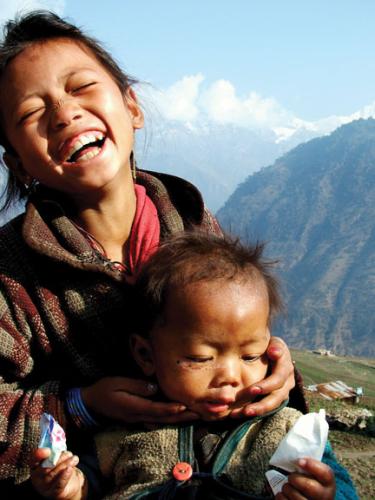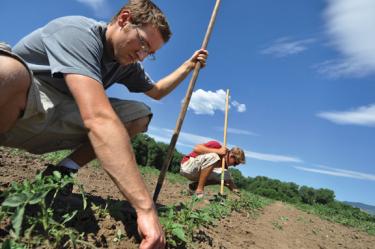During the summer when you were 20, anything was possible. You held your first job, maybe went to war, fell in love, lived with good friends and an overflowing sink of dirty dishes and volunteered to make the world a better place. Without fail, September called you back to campus with its cool nights, engaging classes and spirited football games. And life marched on.
The rest is history, except that every year, CU students travel the paths you wore down, journeying to organic farms thriving off hope, villages tucked in the rugged Himalayas and towns dotted across sun-scorched Africa. The students are chasing that same sense of promise and possibility you followed, hoping to hold onto it.
More than 13,000 students on the CU-Boulder campus volunteer in some way each year, either through class work, programs, student group activities or on their own. Some of their stories follow in the next four pages. You may recognize yourself or the self you wanted to be when you were young and the world rolled out its red carpet.
So, here’s a curtain call to all those carefree days lingering in the backstage of your memories and to these students who have scripted ways to make summer’s lessons stretch far beyond them.

Andrea Pauline
Andrea Pauline, a junior psychology major, and her sister, junior management major Leah Pauline, were interning in Uganda last year when they discovered 150 children being abused in terrible living conditions. They fell in love with the kids and proceeded to establish Musana Children’s Home in Iganga, which houses 80 children in an area of the country with the highest incidence of HIV/AIDS.

Leah Pauline
Leah spent the spring semester there and Andrea runs the house on a full-time basis, taking time off from her studies. How did they get Musana established so quickly? “Things are possible if you put your mind to it and take action on what your goals are,” Andrea says.
For more information see www.musana.org.
Mark Arnoldy faced a life-death situation during his first trip to Nepal in 2007. Severely allergic to nuts, he accidentally ate food prepared with nut sauce.
Unable to reach a hospital because of a countrywide strike, he survived because of a bottle of Benadryl. But his near-death experience helped him empathize with each Nepali child who dies every 14 minutes from poor nutrition and access to treatment.

Nepalese Children
Ironically, the food that could kill Arnoldy can save thousands of lives and is recommended by international aid agencies to fight malnutrition. Because fortified peanut butter is not a Nepalese diet staple, Arnoldy, with the help of Himalayan HealthCare, spent his summer speaking with rural villagers, aiming to educate people to think of peanut butter as an essential medicine.

Mark Arnoldy
“If we cannot guarantee our children the right to a life free of malnutrition, what else in the world matters?” asks the senior psychology major.
A Mandarin speaker who has studied abroad in England and China, senior Andrew Han spent his summer doing economic research for Merrill Lynch’s global wealth management branch. But he hopes to export his newfound knowledge far beyond his office in Greenwood Village, Colo. His goal is to work in international development with a focus on social entrepreneurship in Africa and beyond.

Andrew Han
His internship — and his in-progress senior thesis on China’s role in development projects in Tanzania — steered him down this path. He hopes to help funnel capital to what he refers to as the “right” places — infrastructure development and agribusiness.
“This whole financial crisis has taught me lessons about greed, risk taking that can spiral out of control and the downsides to privatization,” says the finance major. “We have to understand the whole picture of privatization to achieve social justice and equality in this world.”
Named Beyond Organic Farm, the project grew out of conversations Omasta, Kyle Baker and other CU students had about a book they read in a class, Michael Pollan’s The Omnivore’s Dilemma: A Natural History of Four Meals (Penguin).
Fortunately, Baker had interned with John McKenzie, a longtime Boulder farmer, who offered a portion of his land to the students to cultivate. Because most of the 200 involved had never worked on a farm, McKenzie provided critical guidance.

Under the shadow of Longs Peak, CU junior Jacob Golding, above left, and senior Dan Omasta, above right, cultivate tomato plants growing on a 40-acre northeast Boulder farm run exclusively by CU student volunteers with some faculty and staff.
“From mushroom and weed identification to crop growing I’ve learned a lot, but I think I’ve learned most about how to work as a team to make something like this happen,” Baker says, pointing to the green fields.
Twice a week, students sell their produce at the Boulder Farmers’ Market and have a blossoming Community Supported Agriculture program where members pay a lump sum for 20 weeks of produce.
Learn more at www.beyondorganicfarm.com.






